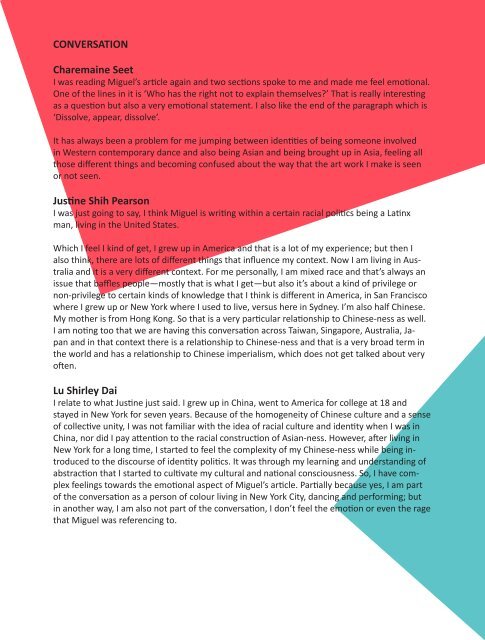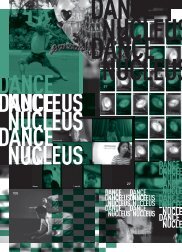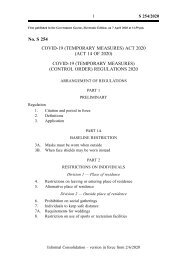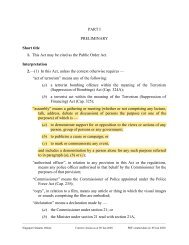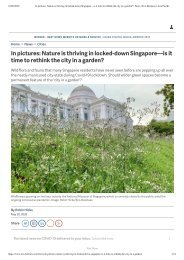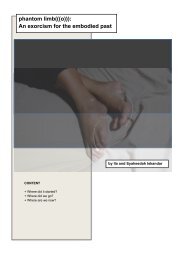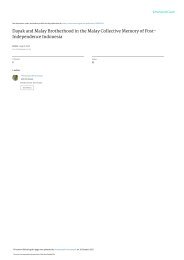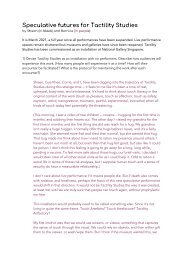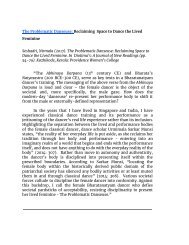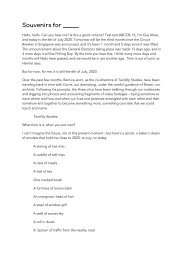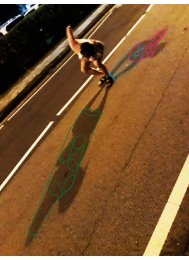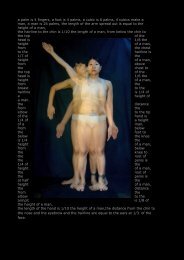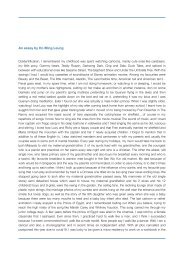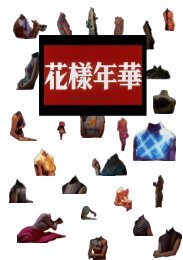Critical Path Digitalmeetup_Transcript
You also want an ePaper? Increase the reach of your titles
YUMPU automatically turns print PDFs into web optimized ePapers that Google loves.
CONVERSATION<br />
Charemaine Seet<br />
I was reading Miguel’s article again and two sections spoke to me and made me feel emotional.<br />
One of the lines in it is ‘Who has the right not to explain themselves?’ That is really interesting<br />
as a question but also a very emotional statement. I also like the end of the paragraph which is<br />
‘Dissolve, appear, dissolve’.<br />
It has always been a problem for me jumping between identities of being someone involved<br />
in Western contemporary dance and also being Asian and being brought up in Asia, feeling all<br />
those different things and becoming confused about the way that the art work I make is seen<br />
or not seen.<br />
Justine Shih Pearson<br />
I was just going to say, I think Miguel is writing within a certain racial politics being a Latinx<br />
man, living in the United States.<br />
Which I feel I kind of get, I grew up in America and that is a lot of my experience; but then I<br />
also think, there are lots of different things that influence my context. Now I am living in Australia<br />
and it is a very different context. For me personally, I am mixed race and that’s always an<br />
issue that baffles people—mostly that is what I get—but also it’s about a kind of privilege or<br />
non-privilege to certain kinds of knowledge that I think is different in America, in San Francisco<br />
where I grew up or New York where I used to live, versus here in Sydney. I’m also half Chinese.<br />
My mother is from Hong Kong. So that is a very particular relationship to Chinese-ness as well.<br />
I am noting too that we are having this conversation across Taiwan, Singapore, Australia, Japan<br />
and in that context there is a relationship to Chinese-ness and that is a very broad term in<br />
the world and has a relationship to Chinese imperialism, which does not get talked about very<br />
often.<br />
Lu Shirley Dai<br />
I relate to what Justine just said. I grew up in China, went to America for college at 18 and<br />
stayed in New York for seven years. Because of the homogeneity of Chinese culture and a sense<br />
of collective unity, I was not familiar with the idea of racial culture and identity when I was in<br />
China, nor did I pay attention to the racial construction of Asian-ness. However, after living in<br />
New York for a long time, I started to feel the complexity of my Chinese-ness while being introduced<br />
to the discourse of identity politics. It was through my learning and understanding of<br />
abstraction that I started to cultivate my cultural and national consciousness. So, I have complex<br />
feelings towards the emotional aspect of Miguel’s article. Partially because yes, I am part<br />
of the conversation as a person of colour living in New York City, dancing and performing; but<br />
in another way, I am also not part of the conversation, I don’t feel the emotion or even the rage<br />
that Miguel was referencing to.


